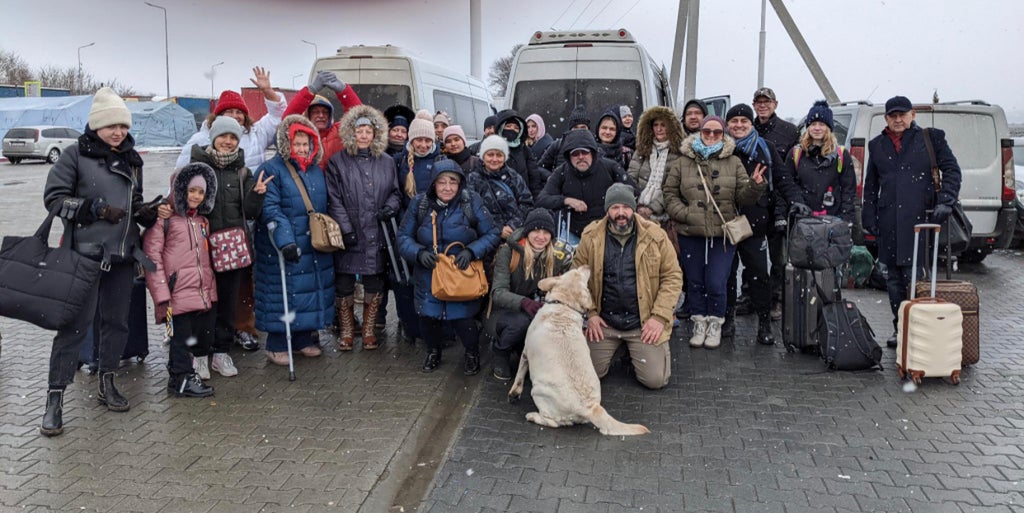
This feature was originally published in March 2022
When The Independent spoke to Project Dynamo cofounder Bryan Stern in March, he was driving through Kyiv suffering from a perforated ear drum.
That morning had been his closest call to date with Russian forces in the almost three weeks since his Florida-based non-profit started running rescue missions to evacuate people out of Ukraine.
During a mission to try to reach an American man and his Ukrainian wife who are stuck in a village north of Kyiv, Russian troops attacked his vehicle with artillery fire.
“I got the crap kicked out of me by Russian artillery this morning,” he said.
The village was surrounded by Russian troops who in turn have been surrounded by Ukrainian troops - making evacuation of civilians inside the area somewhat impossible.
Mr Stern said the Ukrainian troops told him it was too dangerous to let him pass through their checkpoints around the village.
“We drove around it in a big circle trying to get in but we weren’t allowed in,” he said.
“So we got information on what was happening so we knew where the Russians were going and also knew where the Ukrainians were going.
“We found a window of time where none of them were going to be in the same place at the same time as [the couple] so we could move in.
“And it worked - but then it fell apart as the time window closed and, almost like clockwork, the Russians started dropping artillery on our position and hit where we were.”
He and his driver luckily survived the attack from Vladimir Putin’s forces, but they had no choice but to turn back.
The American-Ukrainian couple are still trapped in the village.
Having to face the fact that he can’t save everyone is “terrible”, said Mr Stern.
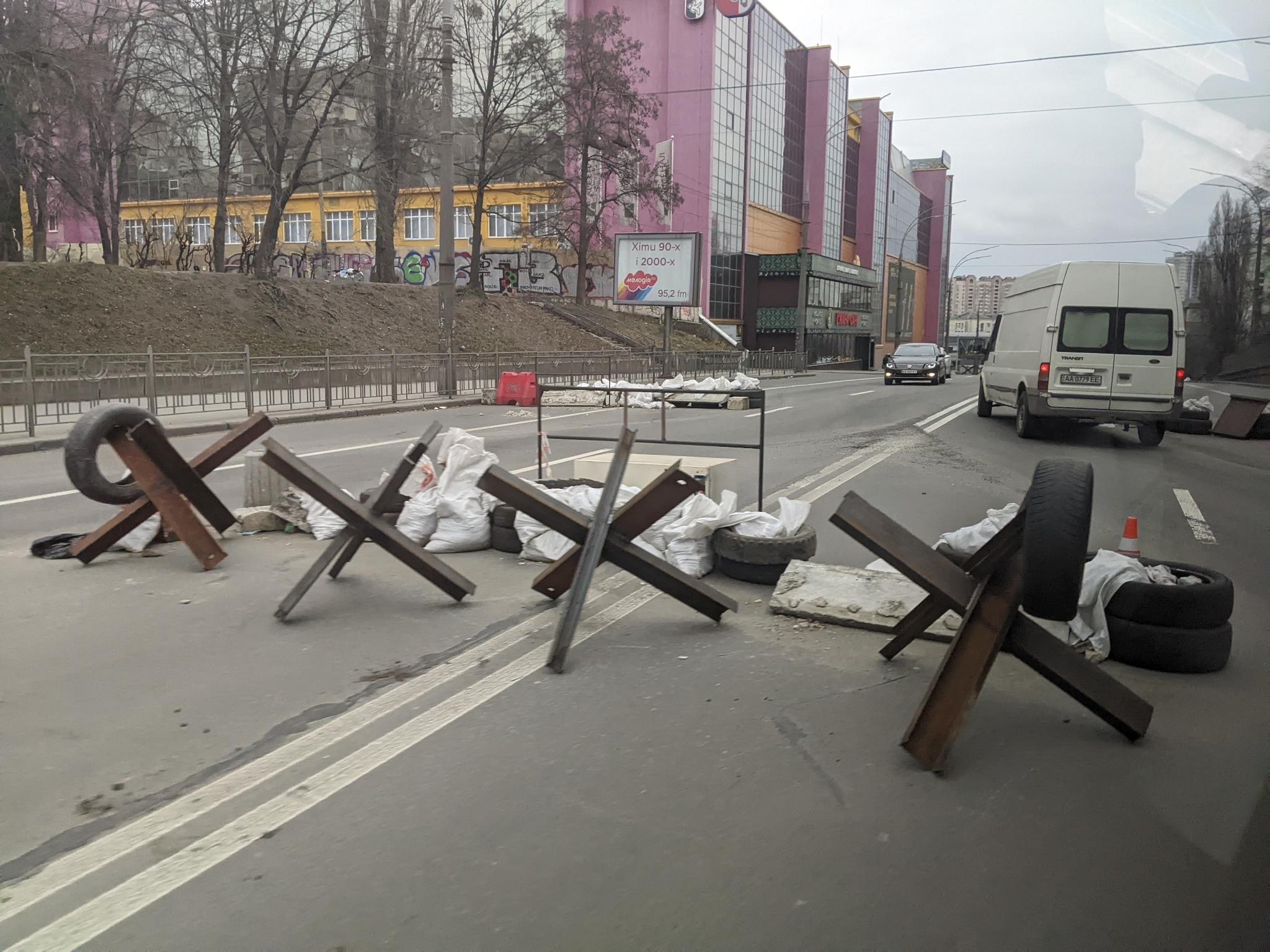
“Today, I tried for hours and hours and hours to get to them. I got there at 9am in the morning and tried and tried and tried,” he said.
“And you build a relationship with these people. I’d spoken to them like 50 times in the last three days.
“And he was telling me ‘leave me, leave me, it’s too dangerous for you’ and I’m like ‘I can’t give up’... but I couldn’t get to them.”
Mr Stern plans to make another attempt to reach the couple but, with Kyiv now locking down for two days, he isn’t sure when that will be.
“You can plan the tactics but you can’t plan the threat,” he said.
“Kyiv is about to have a bad couple of days. My driver and I have seen the Russian offensive today and it’s real bad.”
Mr Stern said he was heading out of the capital on Tuesday before it locks down because Project Dynamo’s rescue missions would be “paralysed” if he was stuck in the city.
Building the arc before the flood
Since Russia invaded Ukraine back on 24 February, Project Dynamo has evacuated around 200 people from Ukraine to bordering countries of Poland and Romania, many of them US citizens.
US veteran Mr Stern originally set up the non-profit last August to rescue civilians and US allies from Afghanistan after the Taliban takeover.
Named after Operation Dynamo - the mission that evacuated soldiers during the Battle of Dunkirk in World War Two - and entirely funded by donations, the organisation was first to land a charter plane for evacuees in the Taliban-controlled country.
In mid-February, with the threat of an invasion from Mr Putin becoming increasingly likely, the group turned its attention to evacuating people from Ukraine.
Mr Stern explained that the war hadn’t started yet but “Noah built the arc before the flood”.
He traveled to Ukraine and built the infrastructure to run an operation including making contacts, arranging transportation, and setting up safe spaces in both parts of Ukraine and in neighbouring countries.
Around a week later, Mr Putin declared war.
Within minutes, Project Dynamo began evacuating Americans out of the country.
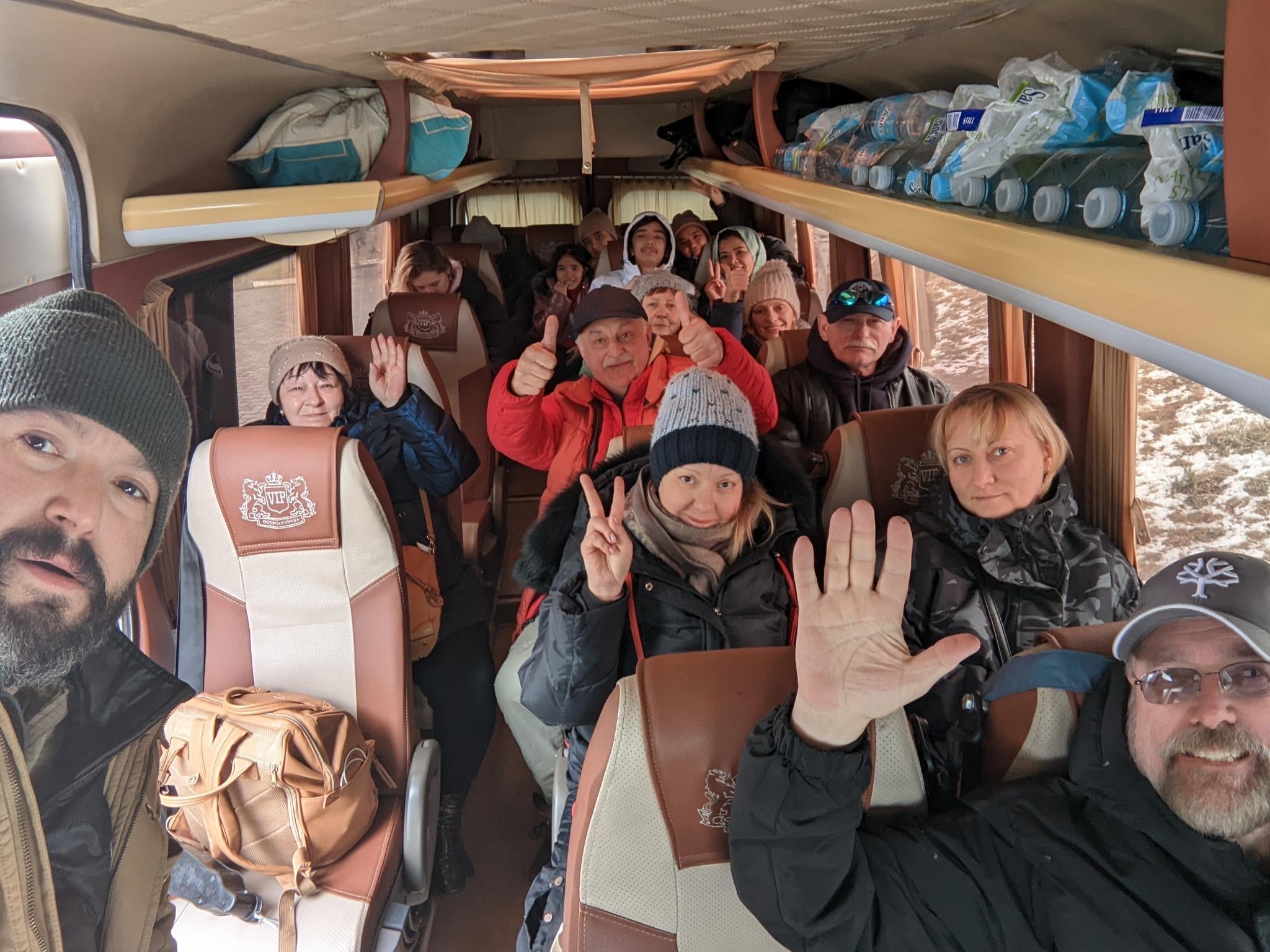
“On 24 February at five in the morning missiles landed in Kyiv about 1.5km away from my hotel,” he said.
“When it happened I pushed the red button and about 15 minutes later, the bus pulled up at my hotel and we drove and picked up a bunch of Americans and we were already well on our way down the road out of the city by the time most of the missiles struck.”
Despite his experience carrying out rescue missions in Afghanistan, Mr Stern said both the operation and the situation on the ground in Ukraine are “completely different”.
“Afghanistan was in the last pages of a 20-year conflict,” he said.
“These are the first two to three pages of a brand new conflict and the stakes are really high.
“This war has so many pieces to it. Putin is talking about nuclear weapons and civilians are being targeted. Just while we’re talking, civilians are dying and buildings are being reduced to rubble.
“As bad as the Taliban is, it’s different. There were no missiles coming.”
Afghanistan’s neighbouring countries did not allow evacuees to cross the border by land so everyone had to be evacuated by air, he added.
By contrast, neighbouring countries are welcoming refugees across the land borders but there is no chance of using aircraft to fly people to safety.
“We’ve got to go by ground. It’s exactly what you couldn’t do in Afghanistan,” said Mr Stern.
The list keeps growing
He explained that people trying to evacuate from Ukraine contact Project Dynamo through its website.
Mr Stern said he then finds a location in the middle of a group and arranges for them all to meet there and board a bus.
Usually, they will spend the night at a safe location in southern Ukraine before traveling on to the country’s border with either Romania or Poland, where a bus is waiting just on the other side to take them to a safe location in that country.
So far, Project Dynamo has received more than 14,000 requests to help evacuate people from Ukraine.
And as “the list keeps growing”, the situation is becoming increasingly dangerous and rescue efforts increasingly challenging, he said.
As he spoke to The Independent from his vehicle, Mr Stern and his driver were forced to drive through several checkpoints and - at one point - passed through an area which appeared to have just been shelled.
He described how there was smoke all around and a taste of sulphur in the air.
Earlier that same day, he had seen four civilian cars targeted by Russian artillery right before his eyes.
There were no survivors.
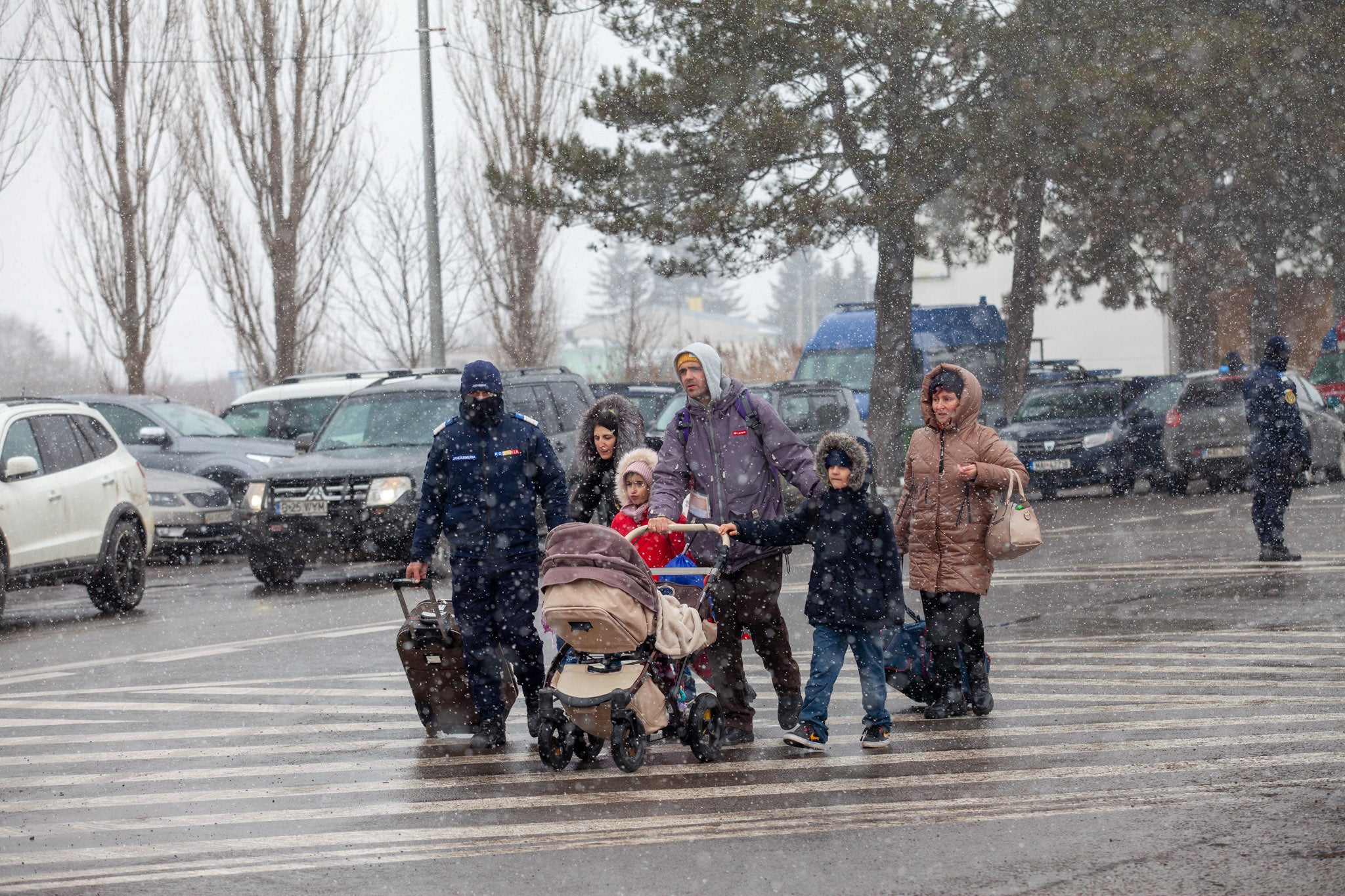
“Were those cars hauling hand grenades? I don’t know. Were they carrying baby diapers? I don’t know. And probably the Russians don’t know either,” he said.
Meanwhile, some areas where people need to be evacuated are almost impossible to reach due to the severity of Russia’s attack, with Mr Stern admitting he is concerned that “real soon, there won’t be anyone there to save”.
In the city of Kharkiv, he has been working on an operation to try to evacuate around 150 people.
“But Kharkiv is taking artillery hits every four minutes for the last two weeks - the city is being systematically flattened, people are being exterminated and we just can’t get there,” he said.
“We have to figure out what we can do. The first rule of hostage negotiation is to take what you can when you can.
“If I can get 20 people out of Kyiv then that’s better than going to Kharkiv and getting shot and then I’m getting no one out.”
Mr Stern is also steering clear from using the humanitarian corridors agreed on by Russian and Ukrainian officials, he said.
“The Russian army is frustrated and they’re shooting up ambulances and civilian cars so a green corridor sounds like a target opportunity,” he said.
Heartbreaking goodbyes
When he reaches evacuees, Mr Stern said they have already suffered intensely traumatic experiences.
“When you meet us, you’re pretty much having the worst day of your life. When they call us they’ve run out of options,” he said.
“Their stories range from the terrible and horrible to complete nightmares. Some people are shell-shocked, they are traumatised, one woman had been raped... there’s young children, really old people.”
All are forced to leave their old lives behind and many also their loved ones behind, as men aged 18 to 60 are not allowed to leave Ukraine.
“People are whittling down all their belongings to a backpack. For some people all they have is a shopping bag and they are leaving everything they know to be true behind,” said Mr Stern.
“When they meet us, they are taking the next step on their path of life - and some have plans and families and know people in places they are going to but a lot of them are like ‘what do we do now?’
“Husbands are left behind. Lots of mothers with children say goodbye to their husbands and become single moms as they cross the border into a foreign country where they don’t speak the language as the men must stay to fight.”
For all the tragic goodbyes as families are torn apart, Mr Stern said evacuees have such a sense of “relief” when they cross the Ukrainian border and he has witnessed some incredible reunions as family members reunite on the other side.
Incredible reunions
Last week, three newborn babies born by Ukrainian surrogates were evacuated from a Kyiv hospital in a daring mission dubbed “Gemini”.
American parents Alexander Sasha Spektor and Irma Nuñez were anxiously waiting to meet their twin boys Lenny and Moishe on the other side of the Ukrainian border in Poland to take them back home to Chicago.
The twins had been born prematurely weighing just four pounds, just one day after the war started.
“As soon as they were born they were children of war,” said Mr Stern.
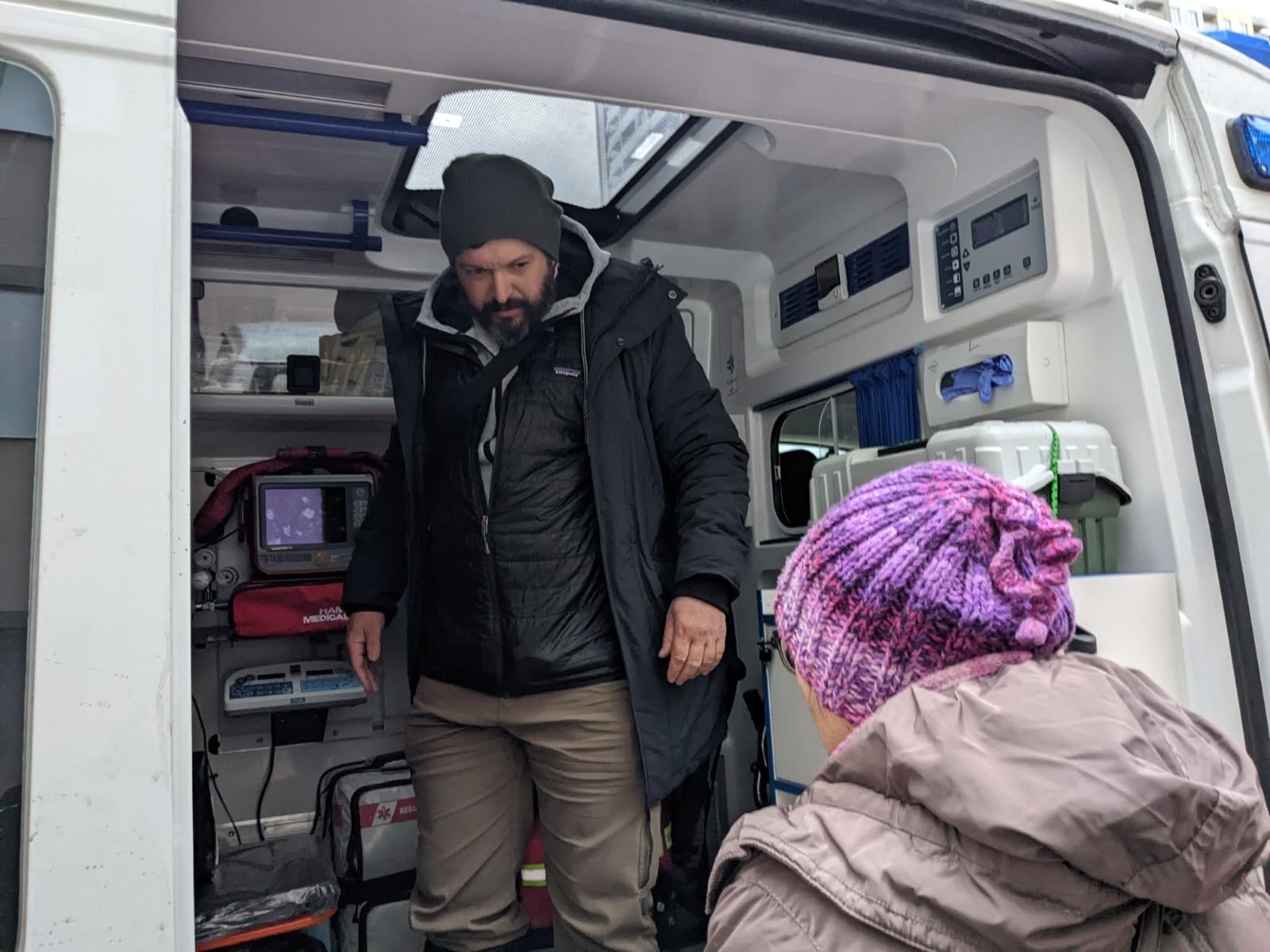
The twins and a third baby named Sophia, whose parents were waiting for her back in the UK, were especially vulnerable because of being born early which made it all the more important to get them out of Ukraine.
“If the power went out at the hospitals they would have died. If the windows were blown out and they breathed in the particulates they would have died,” said Mr Stern.
With the help of a team of doctors and nurses, he described how he first picked up Moishe and Lenny from one hospital, before driving to a second hospital to pick up baby Sophia.
They drove the three newborn babies 14 hours cross-country through the snow in an ambulance before finally reaching Poland.
The journey was “hair-raising”, said Mr Stern, calling it the “scariest thing I’ve ever done” up until he came under attack from Russian forces on Tuesday morning.
A matter of hours or days could have made all the difference between the escape being a success or not, he added.
The very morning of their escape, heavy artillery fell close to the hospitals where the babies were being cared for.
Two days after one of the surrogate mothers left hospital, huge artillery shells landed on the maternity wing, said Mr Stern.
“If they had been there at the time, she and the babies would have been dead,” he said.
Thankfully, the mission did go to plan and the babies are now beginning their new lives with their parents.
Mr Stern said the moment he introduced Mr Spektor to his sons brought tears to his eyes.
“The moment I opened the ambulance door I felt like a delivery room doctor as Sasha had never seen his children before,” he said.
“I was like ‘are you ready to have your world rocked? Are you ready to meet your sons?’
“I don’t think he even heard me, he was just so excited.”
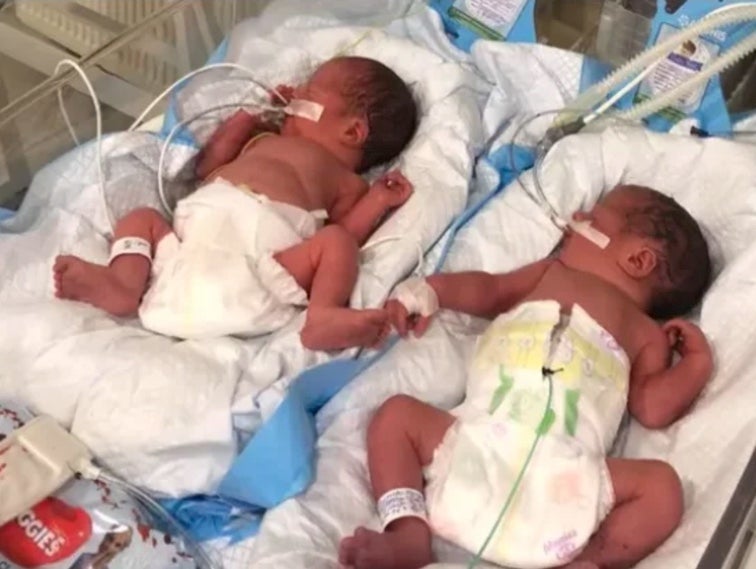
Mr Stern added: “I’m a combat soldier so I’m not someone you want to make angry and there I was with tears rolling down my eyes, it was so emotional.”
The rescue of the babies is one of many positive stories to come out of Project Dynamo’s work, with over 200 people so far saved and taken to safety out of Ukraine.
On Monday, Mr Stern said he evacuated 90 people from Kyiv including Americans, Ukrainians, Georgians and a Briton.
“Each person’s story is special and I cherish every single one,” said Mr Stern.
Counting the high number of surrogate babies with American parents, he expects the number of US citizens still inside Ukraine almost three weeks into the war to be in the hundreds.
Most of the people he evacuates to safety have some sort of connection to the US but Mr Stern said the only rule Project Dynamo has around who it saves is that “we don’t ever leave a bus seat empty”.
A red line
While he describes the organisation as “apolitical”, Mr Stern said that he does feel the US and its Nato allies have been too reactive and not proactive enough to Mr Putin’s aggression.
“If we establish a red line I think it’s important that we stick to it,” he said.
“Someone asked me the other day: if I was the president of the US what would I do? And I would take two battalions of special forces and two apache helicopters to the US embassy in Kyiv and say ‘Russia, we’re taking this back. You know this is our land. Touch this or harm an American head and it’s an act of war’.
“The problem is it’s all been too reactionary. You can’t take action in response if you haven’t set the rules up in advance.
“The president should get on TV and say ‘this is the deal, if an American is killed or an American requires safe passage if you don’t grant it then we will bomb you’.”
Because such a stance wasn’t set in advance, Mr Stern said he thinks it’s now difficult for the US to take a strong stance against Russia for the deaths of two American journalists in recent days.
It’s now also too late to set up a no-fly zone, in line with Ukraine’s requests.
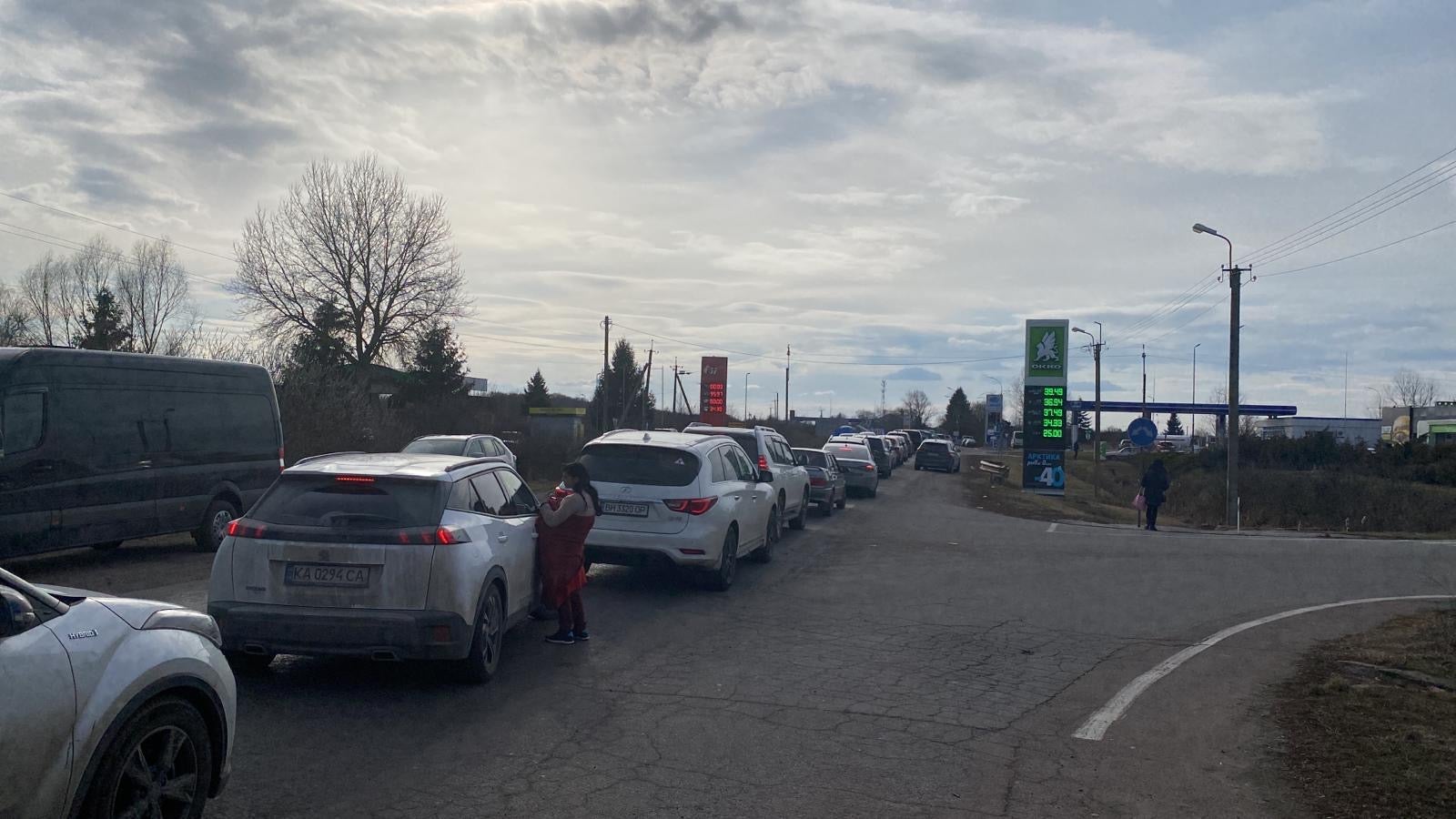
“I’m a big advocate [for a no-fly zone]... but to do it now it would become escalatory. It’s too late,” he said.
However, he feels that the West is getting to a point where they need to go beyond sanctions.
“Sanctions are great but [Mr Putin] is still here and is killing as many civilians as possible,” he said.
“At that point, do we watch on TV or do we act?... Sometimes a cupcake made out of rainbows isn’t the answer.”
For now, with no end in sight to Russia’s attack, Mr Stern will continue to evacuate as many people as he can from the war zone - something he accepts has put a target on his own head.
“I got shot at and blown up today. I’m sure if the Russians found me they would go to work on me with a blowtorch and a pair of pliers,” he said.
Despite that thought, he said he isn’t afraid of Mr Putin’s army and accepts the job is getting harder by the day.
He added: “Nothing is easy - it’s war.”
The Independent has a proud history of campaigning for the rights of the most vulnerable, and we first ran our Refugees Welcome campaign during the war in Syria in 2015. Now, as we renew our campaign and launch this petition in the wake of the unfolding Ukrainian crisis, we are calling on the government to go further and faster to ensure help is delivered. To find out more about our Refugees Welcome campaign, click here. To sign the petition click here. If you would like to donate then please click here for our GoFundMe page.







